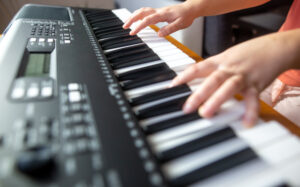 The selection of pianos to choose from can be daunting when you’re first getting into music. After all, there’s so many brands, styles, models, and setups you get to choose from, and it can be overwhelming when you’re just starting out.
The selection of pianos to choose from can be daunting when you’re first getting into music. After all, there’s so many brands, styles, models, and setups you get to choose from, and it can be overwhelming when you’re just starting out.
The good news is there isn’t a huge barrier to entry into learning the piano. Besides piano lessons in Atlanta, all you really need to get started is, well, a piano! Continue on to find out what piano you or your student needs as a beginner.
The Types of Pianos
The first thing to understand when making a purchase decision is understanding the different types of pianos you’ll encounter. There are only two categories to be familiar with: acoustic and electronic.
Electronic Pianos
Electronic pianos will almost always be cheaper, more convenient, and often times smaller than a real piano. The trade off with a digital keyboard is that most of the time the keys are not weighted to emulate a real piano. The tone and sounds digital pianos produce are only imitations of real pianos, which means they’re not quite as natural sounding. Nevertheless, some digital pianos sound pretty close to a real piano, and unlike a piano teacher for kids, a student will not really hear the difference when first learning.
Electric pianos have other features that a student may be interested in having, as well. Electric pianos have built in metronomes, which help you keep time. These are really helpful when you’re just starting out piano lessons and it’s convenient to have them built in. If you opt for an acoustic piano, you can always download a metronome app or buy one online.
Other perks of electric pianos are the built-in sounds and recording capabilities they have. These may not be decision makers, but it’s still good to know if you think your beginner student will want to utilize different sounds.
Acoustic Pianos
Acoustic pianos are broken into two subcategories: horizontal and vertical. Vertical pianos are called this because the strings are literally positioned vertically, in opposition to horizontal pianos where the strings lay across the body of the piano.
Horizontal pianos, known as ‘grands’ are one of the oldest and most original pianos ever designed. You’ll typically see these in orchestral halls and more traditional settings because of the history and origin of the grand. These instruments are some of the biggest, and most well-designed pianos out there. They take up a lot of space and normally cost a good chunk of money. If you’re able to afford one of these, you won’t be disappointed by the tones and beauty these pianos have to offer.
If you’re unable to afford such a beautiful piano or don’t have the space for it, don’t fret! Vertical pianos provide weighted keys, are easier to afford, and take up less space. They’re beautiful instruments that have their own ‘tone’ that many artists strive to capture. Sometimes you can find families giving away these sorts of pianos that have lived through multiple generations. At the end of the day, if you’re just starting out with piano lessons, you’ll hardly notice the difference between a grand versus an upright anyway.
How Do You Choose What Piano Is Best For You?
Now that you have an understanding of the differences and tradeoffs between acoustic and electric pianos, it should be a bit easier to make a decision.
If you have the space and money to afford a grand piano, your student will be learning on the best setup available. They’ll have the benefits of playing on weighted keys and will be able to enjoy the tone and sounds the piano was originally designed to make.
If space and money is tight, there’s nothing wrong with using an electric piano! They are great for learning on, are cheaper, have built in function, and will take up a lot less space. Plus your student can always upgrade if they desire to.
If you’re in the middle, you can’t go wrong with an upright. You get the benefit of having a real, natural piano with weighted or semi-weighted keys, and you don’t sacrifice space. They typically cost less as well.
Get Lessons with Our Incredible Piano Teachers!
Once you’ve gotten your piano, whether digital or acoustic, contact Lessons in Your Home today so we can get your beginner pianist set up with a great piano teacher. Our teachers will come right to your home for every lesson, plus we offer virtual music lessons, too. However, our online music lessons are being taught by local music teachers with live lessons tailored to your child! Contact us today to learn more.
